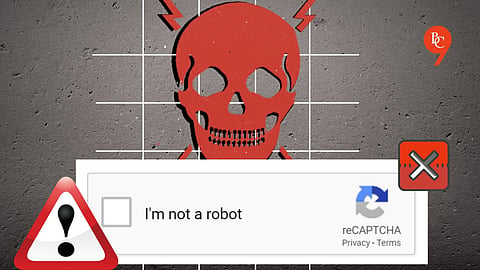

Don't you hate it when you have to frustratedly exit a website only because you couldn't understand their CAPTCHA image? Why should a bunch of jumbled up words decide if or if you shouldn't access a website? Isn't it rather obvious that you're not a robot? And more importantly, why should a robot ask you if you're a robot? Well, whether you like it or not, there is a valid reason behind this extra step between you and the website. And fortunately, we're here to simplify it for you! But before you find out how to solve it, here's a little backdrop on CAPTCHA and why it's crucial:
What is CAPTCHA?
Imagine this: You're having a chill day at work, and you think of looking for new artists for your playlist. Site after site, you land upon the ideal page with a list of lesser-known artists, and you silently rejoice! But just when you're about to enter, you're rudely interrupted by a puzzle-like grid asking you to pick traffic lights! But the real question is, why do we need a mechanism like this?
A CAPTCHA (Completely Automated Public Turing test) provides complex puzzles that only humans can solve to keep away bots from their website. Yes, which means the next time you're waiting for concert tickets to go on sale at midnight, you have a better shot of bagging those premium seats than most bots. That doesn't sound very thrilling, we know — but to website owners, having CAPTCHA increases the probability of measuring real-time users and authentic traffic. Here are some other reasons why CAPTCHAs help a website:
- Fetches authentic poll results: A CAPTCHA on a survey page ensures that every vote entered is by a human and not a bot. It helps in discouraging multiple entries and does not limit the overall number of votes.
- Watches over online registration: CAPTCHA prevents bots from spamming registration forms. It prevents the company's resources from going to waste and lessens the chances of fraud.
- Blocks fake comments: CAPTCHA ensures that there are no fake comments on your articles and posts. It prevents bot-based targeted harassment that takes place online.
CAPTCHA images are often a series of numbers, words or images that bots cannot recognise. More often than not, it requires human intelligence that interprets the text or the sequence of the pictures. Bots can only follow a specific pattern and hence cannot comprehend these variables within their program. However, due to advancement in technology and AI, today, bots can crack superior CAPTCHA codes. So, if you find it tricky to decipher one, it's definitely not you!
Drawbacks of using CAPTCHA
Of course, nothing is fool-proof. CAPTCHA is solid when it comes to restricting regular bots on your website. However, it also has a negative impact on its users and audience generated by its content:
- It leaves users frustrated and, in return, increases the bounce rate on your website.
- CAPTCHA becomes difficult for users to understand and doesn't fulfil their purpose of visiting the site.
- It is time-consuming and hampers the urgency value of its audience.
- Sometimes, it doesn't load for those using assistive devices or screen readers.
So, in conclusion, yes, CAPTCHA is becoming challenging to solve. And as years go by, it might have to switch to another method to retain its purpose. Despite Google not giving out a lot about their CAPTCHA information, we sure hope there's an easier way to decipher the codes we're often faced with online!
